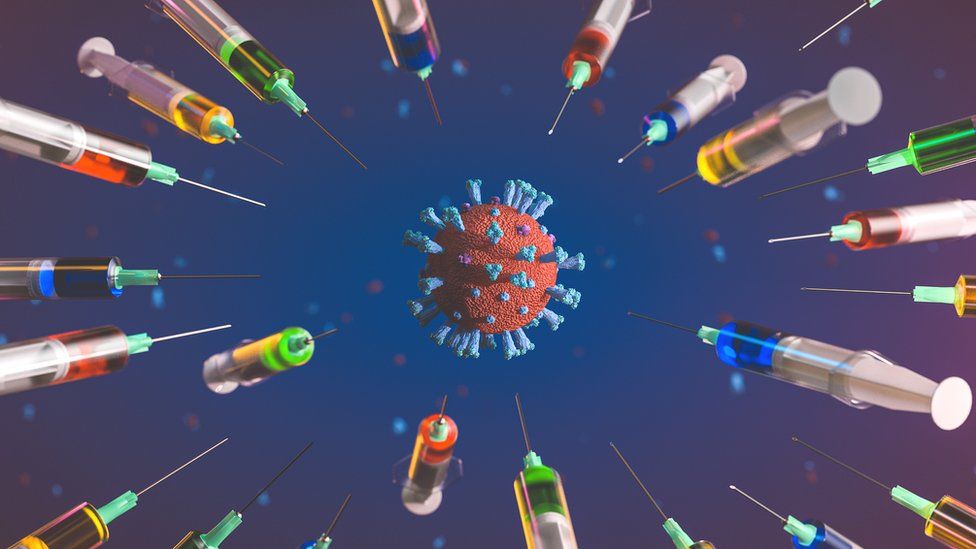Some cases have also been recorded in the UK, so what do you need to know about XBB.1.5?
What is XBB.1.5?
It is yet another offshoot of the globally-dominant Omicron Covid variant. Omicron has outperformed the earlier Alpha, Beta, Gamma and Delta coronavirus variants since emerging in late 2021.
Omicron has also given rise to many more contagious sub-variants.
Symptoms of XBB.1.5 are thought to be similar to those of previous Omicron strains. Most people experience cold-like symptoms.
Is XBB.1.5 more infectious or dangerous?
XBB.1.5 evolved from XBB, which began circulating in the UK in September 2022.
XBB had a mutation that helped it beat the body's immune defences, but this same quality also reduced its ability to infect human cells.
Prof Wendy Barclay from Imperial College London said XBB.1.5 has a mutation known as F486P, which restores this ability to bind to cells while continuing to evade immunity. That makes it spread more easily.
She said these evolutionary changes were like "stepping stones", as the virus evolves to find new ways of bypassing the body's defence mechanisms.
The Wellcome Sanger Institute in Cambridge is sequencing at least 5,000 Covid samples a week, as part of continuing efforts to track variants.
The institute's Dr Ewan Harrison thinks XBB.1.5 probably emerged when someone got infected with two different Omicron types:
"A bit of the genome from one virus gets joined up with another bit from a second virus, and they merge, and that goes on to transmit."
The World Health Organization (WHO) confirmed that XBB.1.5 has a "growth advantage" over other sub-variants seen so far.
But the WHO said there was no indication so far that it was more serious or harmful than previous Omicron variants.
Where is XBB.1.5 spreading?
According to Centers for Disease Control (CDC) estimates, nearly 28% of Covid cases in the US in the first week of January were caused by XBB.1.5
It had previously estimated as many as 40% of cases were XBB.1.5.
However, the revised figure still represents a sharp increase from only 4% of cases at the start of December.
Covid hospital admissions have been rising in recent weeks across the US, and the government has restarted its free testing programme.
Could the XBB.1.5 variant take off in the UK?
It looks likely. The UK had five Omicron waves in 2022, and further spikes in cases seem inevitable.
Figures for the week to Saturday 17 December from Wellcome Sanger suggested that one in 25 Covid cases in the UK were XBB.1.5.
But that was based on just nine samples, so we need to wait to get a better picture.
The UK Health Security Agency is due to release a report on variants spreading in the UK next week.
Prof Barclay said she expected more hospitalisations in the UK if the variant takes off here, "as we expect it to do".
NHS England has said the fears of a "twindemic" of Covid and flu have already been realised, with both viruses putting strain on an already stretched NHS.
Are scientists worried about XBB.1.5?
Prof Barclay said she was not especially concerned about the general UK population because there was "no indication" that XBB.1.5 would "break through" the protection against severe illness provided by vaccines.
But she is worried about the potential effect on the vulnerable, including the immunocompromised, who get less benefit from Covid jabs.
Prof David Heymann from the London School of Hygiene and Tropical Medicine acknowledged that there was still a fair amount to learn about this latest variant.
But he said it was unlikely to cause major problems in countries like the UK which have high levels of vaccination and previous infections.
His concern was for countries like China, where there was both low take-up of vaccines and little natural immunity because of prolonged lockdowns.
"China needs to share clinical information on people infected in order to see how the variant behaves in a non-immune population," Prof Heymann said.


Comments
Post a Comment